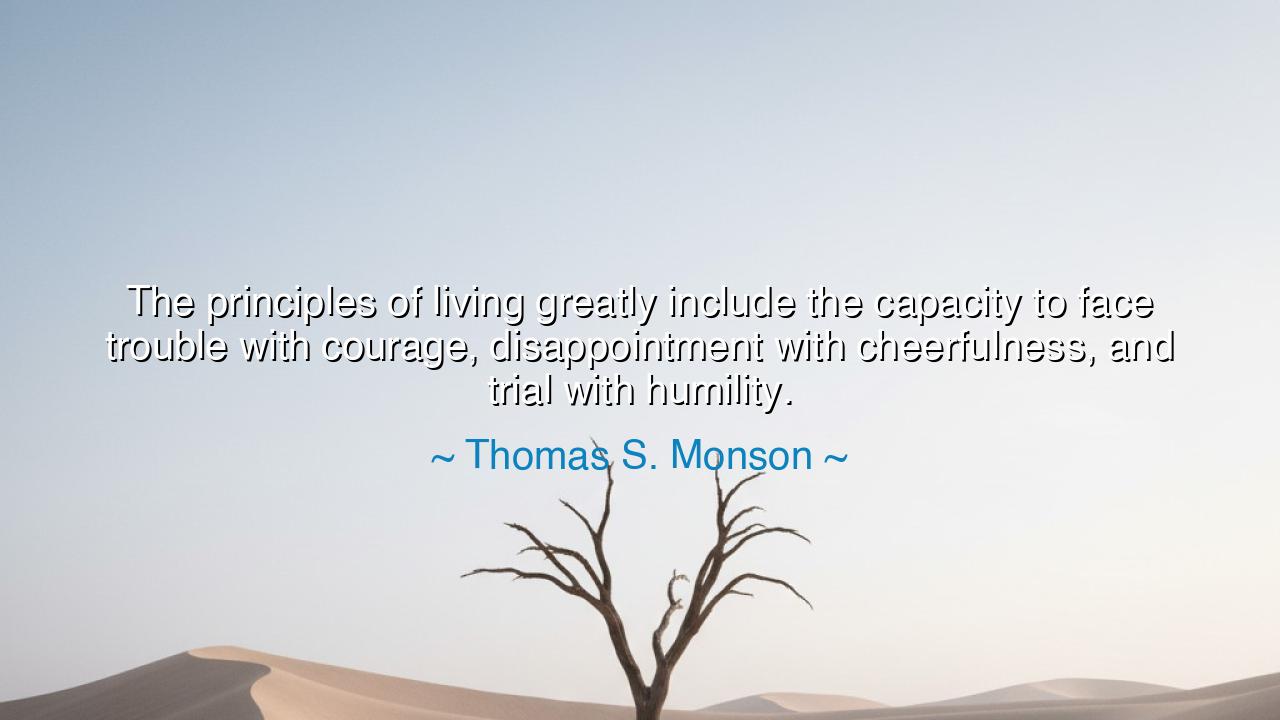
The principles of living greatly include the capacity to face
The principles of living greatly include the capacity to face trouble with courage, disappointment with cheerfulness, and trial with humility.






In the gentle yet steadfast voice of Thomas S. Monson, a man of deep faith and enduring wisdom, we hear these timeless words: “The principles of living greatly include the capacity to face trouble with courage, disappointment with cheerfulness, and trial with humility.” These are not the idle musings of comfort, but the distilled truth of a life spent in service and reflection. In these few lines, Monson captures the essence of true greatness — not the kind that conquers nations or commands wealth, but the quiet, noble greatness that endures hardship with grace and transforms suffering into strength.
Thomas S. Monson, who served as the President of The Church of Jesus Christ of Latter-day Saints, was known not only for his leadership but for his compassion and humanity. He lived through war, social change, and personal loss, yet always taught that life’s storms are not to be feared but faced with faith. His quote, drawn from a lifetime of observing both triumph and tragedy, reminds us that greatness is not measured by how easily we walk through the sunshine, but by how steadfastly we endure the storm. To live greatly, he tells us, is to rise with courage when the path darkens, to smile even when the heart is heavy, and to bow humbly before the mysteries of suffering.
The first pillar of this teaching is courage — the capacity to face trouble without surrender. Courage is not the absence of fear, but the strength to move forward despite it. In the ancient world, the Spartans spoke of courage not as rashness, but as steadfastness — the ability to stand one’s ground when every instinct says to flee. So too did Monson speak of a courage that is spiritual, not violent: the courage to remain kind when the world is cruel, the courage to believe in goodness when evil seems strong, the courage to trust in purpose when life feels senseless. This courage is the foundation of the soul’s endurance.
The second pillar is cheerfulness in disappointment. To meet failure, rejection, or loss with a cheerful heart is one of life’s highest forms of strength. This does not mean to ignore pain, but to refuse to be defined by it. Consider the example of Abraham Lincoln, who suffered repeated defeats, profound depression, and the loss of loved ones, yet continued to lead with humor, warmth, and humility. He once said, “Most folks are as happy as they make up their minds to be.” In this, Lincoln embodied Monson’s wisdom — that cheerfulness in adversity is not denial of sorrow, but mastery over it. It is the choice to keep light alive when darkness presses close.
The third pillar, and perhaps the most profound, is humility in trial. In the face of hardship, pride demands answers, but humility accepts that some suffering refines the soul in ways the mind cannot yet grasp. It is humility that keeps the heart open to learning when pain would make it bitter. The ancients spoke of this as the “discipline of the heart” — the sacred art of bowing without breaking. Monson’s teaching here echoes the wisdom of Job, who, when stripped of all comfort, did not curse the heavens but said, “The Lord gave, and the Lord hath taken away; blessed be the name of the Lord.” True humility in trial does not ask “Why me?” but rather, “What can I learn, and how can I grow?”
Taken together, these principles — courage, cheerfulness, and humility — form a trinity of greatness. They do not make life easy, but they make life meaningful. To live greatly, as Monson taught, is not to avoid suffering, but to allow suffering to carve deeper wells of wisdom and compassion within us. Trouble tests the spirit, disappointment refines it, and trial sanctifies it. The one who meets all three with these virtues becomes like tempered steel — unbreakable, yet shining with quiet grace.
Let this, then, be the lesson to those who walk the winding roads of life: Do not curse your hardships, for they are your teachers. When trouble comes, face it with courage. When disappointment strikes, answer it with cheerfulness. When trials weigh upon you, bow with humility and keep faith that they will pass. For the one who does so lives not merely well, but greatly. Such a person, though battered by the world, becomes its light — living proof that strength need not roar, and greatness need not shout.
And so, as Thomas S. Monson would remind us, true greatness is not about the height of one’s achievements, but the depth of one’s character. It is the spirit that endures, the heart that forgives, and the soul that keeps hope alive. Live by these principles, and though the world may test you, you will stand unshaken — a pillar of quiet greatness, whose courage, cheerfulness, and humility inspire all who walk beside you.






AAdministratorAdministrator
Welcome, honored guests. Please leave a comment, we will respond soon